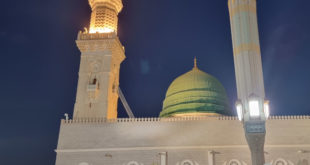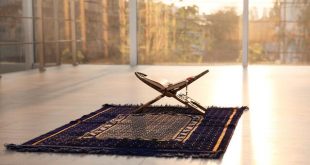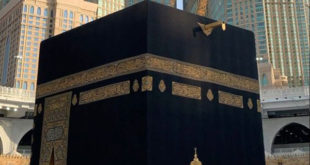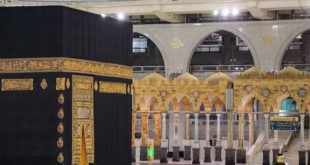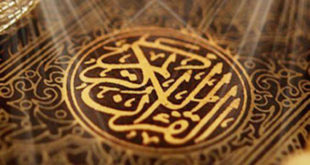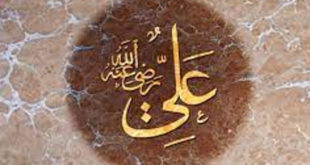Once a woman came to Hadhrat Aishah (Radhiyallahu Anha) and complained to her of her own hard-heartedness, whereupon Hadhrat Aishah (Radhiyallahu Anha) advised her to soften her heart through remembering death in abundance. The woman did as she was advised and after a few days she returned and expressed her …
Read More »Recent Posts
October, 2015
-
30 October
Etiquettes of the Night
عن جابر رضي الله عنه، عن النبي صلى الله عليه وسلم، قال: إذا استجنح الليل، أو قال: جنح الليل، فكفوا صبيانكم فإن الشياطين تنتشر حينئذ، فإذا ذهب ساعة من العشاء فخلوهم، وأغلق بابك واذكر اسم الله، وأطفئ مصباحك واذكر اسم الله، وأوك سقاءك واذكر اسم الله، وخمر إناءك واذكر اسم …
Read More » -
28 October
Reasons for our Dawat not being Effective – Part 2
Another reason for the da’wat not being effective is that we are not exhausting our resources and efforts in correcting ourselves firstly, and those under our control. If the food at home is not right then we will make such a big noise and commotion, but do we apply the …
Read More » -
27 October
Sunnats and Aadaab of Duaa – Part 3
1. After completing your dua, say aameen.
bu Musabbih Al-Maqraaiy (rahimahullah) relates: On one occasion, we were seated by Abu Zuhair An-Numairi (radhiyallahu ‘anhu) who was from among the Sahaabah (radhiyallahu ‘anhum). He was most eloquent in speech. When anyone among us used to engage in dua, he would say, “Seal the dua with aameen, for aameen is like a stamp on the paper.”
Read More » -
26 October
Islam – A Religion of Ease
Hazrat Moulana Muhammad Ilyaas (rahmatullahi ‘alaih) once mentioned: The Qur’aan and Ahaadith have emphatically declared that the Deen of Islam is a religion that is extremely easy to practise upon. In all conditions, practising on the laws of Islam is easy and manageable. Hence, Shari’ah has taken into consideration the …
Read More »
-
Tafseer of Surah Naazi’aat
وَ النّٰزِعٰتِ غَرۡقًا ۙ﴿۱﴾ وَّ النّٰشِطٰتِ نَشۡطًا ۙ﴿۲﴾ وَّ السّٰبِحٰتِ سَبۡحًا ۙ﴿۳﴾ فَالسّٰبِقٰتِ سَبۡقًا ۙ﴿۴﴾ …
Read More » -
Hazrat Talhah (radhiyallahu ‘anhu) in the Battle of Uhud
-
The Bravery of Rasulullah (sallallahu ‘alaihi wasallam) – Orchards of Love – Part 75
-
The Brother-in-law of Rasulullah (sallallahu ‘alaihi wasallam)
-
The Compass of the Hearts of the Sahaabah (radhiyallahu ‘anhum) – The Tolerance of Rasulullah (sallallahu ‘alaihi wasallam) – The Orchards of Love – Part Seventy Four
-
Receiving Seventy Rewards
Hazrat Abdullah bin Amr bin Aas (radhiyallahu ‘anhuma) reported, “Whoever sends salutations upon Nabi (sallallahu ‘alaihi wasallam) once, Allah Ta‘ala and His angels will send seventy mercies and blessings upon him in return of his one Durood. Hence, whoever wishes to increase his Durood should increase it, and whoever wishes to decrease his Durood should decrease it (i.e. if he wants to earn great rewards, then he should increase his Durood).”
Read More » -
Increase in Sustenance
-
The Reward of Fasting on the Day of Arafah
-
The Angel that Stands at the Blessed Grave of Hazrat Rasulullah (sallallahu ‘alaihi wasallam) to Convey the Durood of the Ummah
-
Reciting Durood when Entering the Musjid
-
Sunnats and Aadaab of the Host – 4
4. In the mubaarak Ahaadith, Rasulullah (sallallahu alaihi wasallam) advised the ummah as to which …
Read More » -
Sunnats and Aadaab of the Host – 3
-
Sunnats and Aadaab of the Host – 2
-
Sunnats and Aadaab of the Host – 1
-
Sunnats and Aadaab which every person needs to adhere to in his individual life – 9
-
Hazrat Ali (radhiyallahu ‘anhu) – Part Forty-One – Being Sent by Rasulullah (sallallahu ‘alaihi wasallam) to Level the Graves, Destroy Idols and Erase Pictures
Hazrat Ali (radhiyallahu ‘anhu) reports that on one occasion, Rasulullah (sallallahu ‘alaihi wasallam) attended a …
Read More » -
Rasulullah (sallallahu ‘alaihi wasallam) Approving of the Verdict of Hazrat Ali (radhiyallahu ‘anhu) – Part Forty
-
The True Ulamaa – Hazrat Ali (radhiyallahu ‘anhu) – Part Thirty Nine
-
Du‘aa for Assistance in Settling Debts – Hazrat Ali (radhiyallahu ‘anhu) – Part Thirty Eight
-
The Concern of Hazrat Ali (radhiyallahu ‘anhu) regarding Business being Conducted According to the Islamic Principles – Part Thirty Seven
 Ihyaaud Deen An Effort to Revive Deen in Totality
Ihyaaud Deen An Effort to Revive Deen in Totality








































